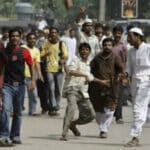Friday saw explosions in the central Iranian province of Isfahan, according to Iranian state media. US media also quoted authorities claiming that Israel had struck back at its bitter enemy.
The nation’s main broadcaster said that explosions were heard close to the city of Isfahan, prompting the activation of air defense systems across other Iranian cities, according to state media.
Following Iran’s weekend missile and drone barrage on Israel, Israel had already threatened to retaliate. The majority of them were thwarted.
Iran’s space agency spokesman Hossein Dalirian stated that “several” drones had been “successfully shot down,” while the Fars news agency reported that “three explosions” had been heard close to Qahjavarestan, close to Isfahan airport and the Shekari army airbase.
On the social media site X, Dalirian stated that there were “no reports of a missile attack.”
The official IRNA news agency stated, “Reports indicate there was no major damage or large explosions caused by the impact of any air threat.”
Iran’s Tasnim news agency said that nuclear facilities in Isfahan are “completely secure.”
Citing US officials, ABC and CBS News stated that Israel was responsible for the strikes. Neither the Pentagon nor the White House responded right away.
An official was quoted by CNN as stating that the Israeli operation did not have a nuclear objective.
“At this time, we don’t have a comment,” the Israeli military said AFP.
The International Atomic Energy Agency (IAEA) separately verified that Iran’s nuclear installations were unharmed.
The agency emphasized that nuclear plants should never be a target in military confrontations and said it is still keeping a close eye on the situation while urging all parties to exercise utmost caution.
The US Embassy in Israel instructs staff to restrict their travel.
The US embassy in Israel instructed its staff members and their families to limit their travel.
According to a security advisory posted on the mission’s website, “US government employees and their family members are restricted from personal travel outside the greater Tel Aviv” area as well as the Jerusalem and Beersheva areas “until further notice” due to an abundance of caution following reports that Israel conducted a retaliatory strike inside Iran.”
The advise stated that the embassy “may further restrict or prohibit” the concerned parties from traveling to certain areas of Israel, the Old City of Jerusalem, and the occupied West Bank due to a “complex” security environment that “can change quickly.”
Suspended flights
Iran launched its first attack to directly target Israel, a regional rival, over the weekend.
With the support of its partners, Israel successfully intercepted the majority of Iran’s 300 missiles and drone launches without losing any lives.
It began its attack in reprisal for an attack on its consulate in Damascus, the capital of Syria, on April 1. Two generals and seven other Iranian Revolutionary Guardsmen were slain in that attack.
After the strike on Israel by Iran, there is much greater fear of a significant regional spillover from the Gaza battle.
Benjamin Netanyahu, the Israeli prime minister, has emphasized that Israel “reserves the right to protect itself” against Iran. Netanyahu has threatened to punish Hamas for the October 7 attack that ignited Israel’s offensive in Gaza.
The primary ally and military supplier to Israel, the United States, has said that it will not participate in a retaliatory strike on Iran. However, it has announced penalties against individuals and organizations who manufacture the drones used in the Iranian attack.
US President Joe Biden declared on Thursday that “we are holding Iran accountable,” following the European Union’s announcement that it will likewise impose sanctions on Iran’s drone program.
Israeli attacks on the Islamic republic will be met with “regret” from Tehran, according to Iranian Foreign Minister Hossein Amir-Abdollahian.
The top leader of Iran, Ayatollah Ali Khamenei, turned 85 years old on the same day as the explosions in Iran.
Large portions of Iran had flight suspensions on Friday, and flydubai, an airline based in the United Arab Emirates, canceled its flights there.
According to IRNA, “Iran’s air defense has been activated in the skies of several provinces.”
“Flights to Tehran, Isfahan, and Shiraz, as well as airports in the west, northwest, and southwest have been suspended,” the Mehr news agency reported.
Commercial flights were circumnavigating Tehran to the north and east and avoiding western Iran, including Isfahan, according to flight-tracking software.
The Midwest is “on a precipice.”
A local activist group reported blasts in southern Syria as well. Rayan Maarouf, the owner of Suwayda24, an anti-government website that carries news from the southern province of Sweida, stated that “strikes were carried out on a Syrian army radar position.”
UN Secretary General Antonio Guterres presented a dire image of the Middle East scenario on Thursday, announcing that escalating tensions stemming from the Gaza crisis and Iran’s attack on Israel may eventually turn into a “full-scale regional conflict.”
The Middle East is at a critical juncture. A dangerous escalation has occurred recently, both in words and deeds, Guterres informed the Security Council.
He urged all sides to show “maximum restraint,” saying that “one miscalculation, one miscommunication, one mistake, could lead to the unthinkable — a full-scale regional conflict that would be devastating for all involved.”
In early Asian trading on Friday, oil prices increased by over three percent in response to news of explosions.








